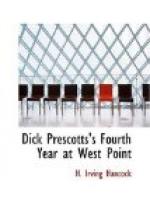“Now,” smiled Mr. Denton, “perhaps we can drop, briefly, some of the relation between officer and cadet. We may be able to talk as friends—–real friends. I trust so. May I feel at liberty to ask you, Mr. Prescott, whether there are any urgent family reasons behind this sudden move of yours?”
“None, sir.”
“Then is it—–but I don’t wish to be intrusive.”
“I certainly don’t consider you intrusive, Mr. Denton, and I appreciate your sympathy and friendship. But I am resigning from the corps for the best of good reasons.”
“May I question you, Mr. Prescott?”
“If you care to, sir.”
“I do wish it, very much,” rejoined Lieutenant Denton, “though I have asked your consent because, in what I am now seeking to do, I am going rather beyond my place as a tactical officer of the Military Academy. If you are sure, however, that you do not find me intrusive, and if you would like to talk this matter over—–not as officer and cadet, but as between a young man and a somewhat older one, and as friends above all, then I am going to ask you a few questions.”
“Although I am certain that you cannot help me, Mr. Denton, I am very grateful for every sign of interest that you may show in me. It is something of balm to me to feel that I shall leave behind some who will regret my going.”
“Prescott,” asked the officer abruptly, “you have been sent to Coventry, haven’t you? You needn’t answer unless you wish.”
“I have, sir,” Dick assented.
“Twice it has happened, when I have been on duty, that you have had to report classmates to me. Now, I’m not going to step over the line by asking you whether those reports were the basis of your being sent to Coventry. But, to please myself, I’m going to assume that such is the case.”
To this Dick made no reply. It was an instance in which a cadet could not, with propriety, discuss class action with an officer on duty at the Military Academy.
“Now, Prescott, I’m not going to ask you whether my surmise is a correct one, but I’m going to ask you another question, as a friend only, and in no official way. Of course, in a friendly matter you may suit yourself about answering it. Have you done anything else that could excuse the class in punishing you?”
“Nothing whatever, sir.”
“Mr. Prescott, aren’t you wholly satisfied with your conduct?”
“I don’t quite know how to answer that, Mr. Denton,”
“Have you done anything that you wouldn’t repeat if the need arose?”
“I have not, sir,” replied Dick with great earnestness.
“Do you feel, in your own soul, that you have done anything to discredit the splendid old gray uniform that you wear?”
“I do not, sir.”
“Answer this, or not, as you please. Don’t you feel wholly convinced that your class has done you an injustice which it would reverse instantly if it knew all the circumstances?”




